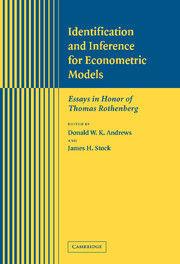Book contents
- Frontmatter
- Contents
- List of Contributors
- Preface
- Part I Identification and Efficient Estimation
- 1 Incredible Structural Inference
- 2 Structural Equation Models in Human Behavior Genetics
- 3 Unobserved Heterogeneity and Estimation of Average Partial Effects
- 4 On Specifying Graphical Models for Causation and the Identification Problem
- 5 Testing for Weak Instruments in Linear IV Regression
- 6 Asymptotic Distributions of Instrumental Variables Statistics with Many Instruments
- 7 Identifying a Source of Financial Volatility
- Part II Asymptotic Approximations
- Part III Inference Involving Potentially Nonstationary Time Series
- Part IV Nonparametric and Semiparametric Inference
5 - Testing for Weak Instruments in Linear IV Regression
Published online by Cambridge University Press: 24 February 2010
- Frontmatter
- Contents
- List of Contributors
- Preface
- Part I Identification and Efficient Estimation
- 1 Incredible Structural Inference
- 2 Structural Equation Models in Human Behavior Genetics
- 3 Unobserved Heterogeneity and Estimation of Average Partial Effects
- 4 On Specifying Graphical Models for Causation and the Identification Problem
- 5 Testing for Weak Instruments in Linear IV Regression
- 6 Asymptotic Distributions of Instrumental Variables Statistics with Many Instruments
- 7 Identifying a Source of Financial Volatility
- Part II Asymptotic Approximations
- Part III Inference Involving Potentially Nonstationary Time Series
- Part IV Nonparametric and Semiparametric Inference
Summary
ABSTRACT
Weak instruments can produce biased IV estimators and hypothesis tests with large size distortions. But what, precisely, are weak instruments, and how does one detect them in practice? This paper proposes quantitative definitions of weak instruments based on the maximum IV estimator bias, or the maximum Wald test size distortion, when there are multiple endogenous regressors. We tabulate critical values that enable using the first-stage F-statistic (or, when there are multiple endogenous regressors, the Cragg–Donald [1993] statistic) to test whether the given instruments are weak.
INTRODUCTION
Standard treatments of instrumental variables (IV) regression stress that for instruments to be valid they must be exogenous. It is also important, however, that the second condition for a valid instrument, instrument relevance, holds, for if the instruments are only marginally relevant, or “weak,” then first-order asymptotics can be a poor guide to the actual sampling distributions of conventional IV regression statistics.
At a formal level, the strength of the instruments matters because the natural measure of this strength – the so-called concentration parameter – plays a role formally akin to the sample size in IV regression statistics. Rothenberg (1984) makes this point in his survey of approximations to the distributions of estimators and test statistics.
Information
- Type
- Chapter
- Information
- Identification and Inference for Econometric ModelsEssays in Honor of Thomas Rothenberg, pp. 80 - 108Publisher: Cambridge University PressPrint publication year: 2005
Accessibility standard: Unknown
Why this information is here
This section outlines the accessibility features of this content - including support for screen readers, full keyboard navigation and high-contrast display options. This may not be relevant for you.Accessibility Information
- 2989
- Cited by
